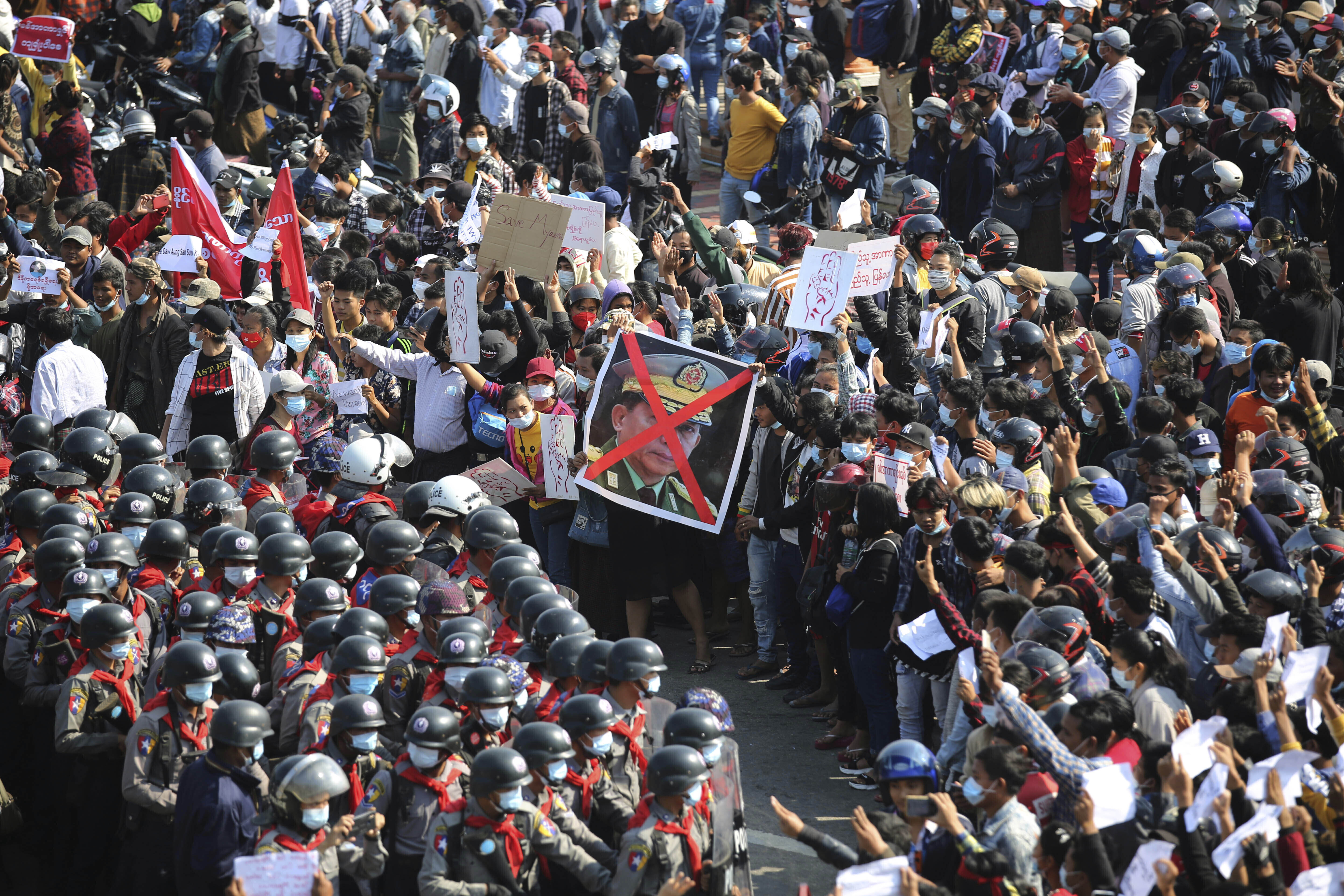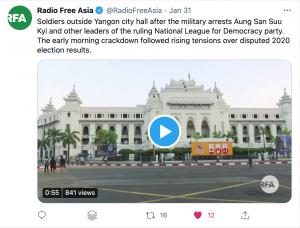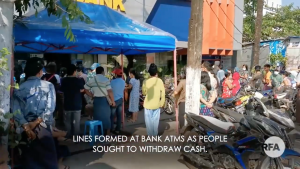Burma coup: USAGM coverage inside the country and from abroad

Protesters flashing three fingered salutes and holding an image with an X mark on the face of Myanmar Commander-in-Chief Senior General Min Aung Hlaing face rows of riot police in Naypyitaw, Myanmar on Monday, Feb. 8, 2021. Tension in the confrontations between the authorities and demonstrators against last week's coup in Myanmar boiled over Monday, as police fired a water cannon at peaceful protesters in the capital Naypyitaw.(AP Photo)
The February 1 coup in Burma has garnered international attention but accessing information within the country is proving challenging for most Burmese residents. The military-controlled government has threatened independent journalists and has begun blocking access to non-state news sources, including social media. With domestic media in retreat, USAGM-supported Radio Free Asia and Voice of America have both seen dramatic audience increases.
The Burmese-language websites of VOA and RFA are still accessible, despite some internet outages, and the agency is expanding its radio transmissions and access to internet safety tools.
Meanwhile, VOA and RFA journalists continue to report on the developments in the country as well as the U.S. and international reactions and implications.
From the beginning, both VOA and RFA shared video on social media showing military personnel patrolling the streets of the capital of Naypyidaw after the military seized control of the country. RFA was the first news outlet to confirm the detainment of Burma’s de facto leader Aung San Suu Kyi.

VOA Burmese saw a spike in audience engagement during its special coverage of the military coup. Scoring big were the service chief’s analysis live in-studio on Facebook and a Burmese rights activist’s take on the crisis in a Skype discussion. Comments/shares on those two interviews alone crossed the 3 million mark, while the service’s website attracted 1.9 million views overnight.
RFA has also seen increased audiences. Its evening news show, which is broadcast on shortwave radio and simultaneously webcast on social media with full video, had a total of 10.1 million views and 1.5 million engagements on February 1, the day of the coup. And in the week from January 28 to February 3, RFA Burmese had 167.4 million video views on Facebook, up 442 percent on the previous week, including 60 million on the day of the coup alone. RFA’s Burmese Facebook page now has almost 11 million followers, up more than 1 million from the previous month.
RFA and RFA-affiliated BenarNews reported from Burma and Thailand providing firsthand accounts. RFA featured a who’s who backgrounder on the major military and civilian leaders involved in the coup, published a list of individuals it could confirm as detained, and highlighted a note, written by Aung San Suu Kyi before her arrest, urging her country to “to protest against the coup by the military.”
The network also featured footage from the streets, showing checkpoints and tight security as well as crowds near banks and in markets as people tried to stockpile food and cash in light of looming uncertainty. On the day following the coup, RFA covered the limited – yet bold – protests by some healthcare workers and other members of the public.

RFA also reported on the fate of tens of thousands of Chinese workers and businesspersons stranded in Burma as all flights out of the country were shut down ahead of the Lunar New Year, a major travel season, which begins on February 12.
From Bangkok, Thailand, which hosts many Burmese migrant workers, BenarNews reported on the clashes between Burmese protesters upset by the coup and the Thai police. The network also pointed out the tepid response to the coup from neighboring governments, with no nation coming forward to condemn the military’s seizure of power.
VOA’s Burmese Service went live on television, radio, and web and social media to tell the story that local media was not providing. VOA provided backgrounders on the events and individuals involved, as well as a timeline of events leading up to the coup. The network also highlighted statements of condemnation by U.S., E.U., and other Western and ASEAN leaders.

VOA also explored the implications of the coup for China’s relationship with Burma, featuring an interview with Yun Sun, a senior fellow and co-director of the East Asia program and director of the China program at the Stimson Center, who said the turmoil will affect Burma’s appeal as a destination for Chinese investments and economic activities.
The network also published interviews with lawmakers, activists, and citizens in Burma, who expressed concern about their safety and that of their loved ones, as well as the political future of the country. “This is not a good sign for democracy,” Zin Mar Aung, a lawmaker with the National League for Democracy, told the VOA Burmese Service. “We want to move forward, and this is not good for national reconciliation and strengthening democracy.”
